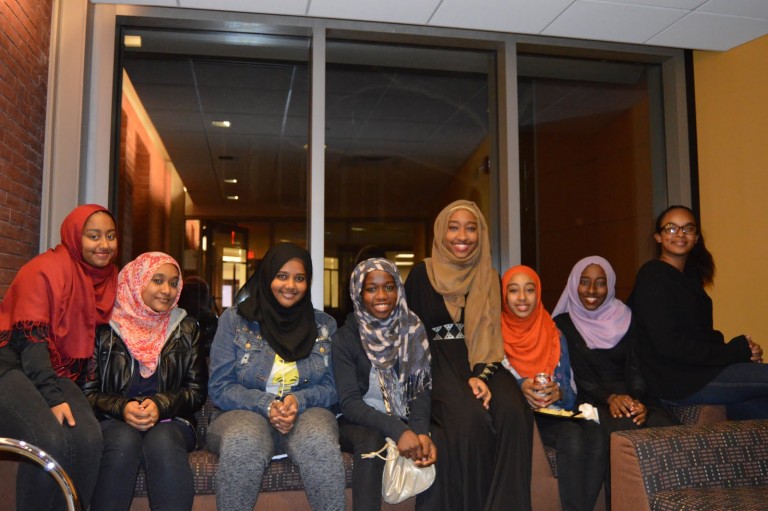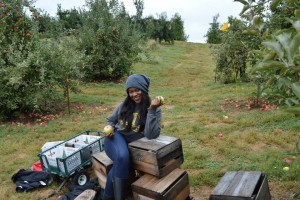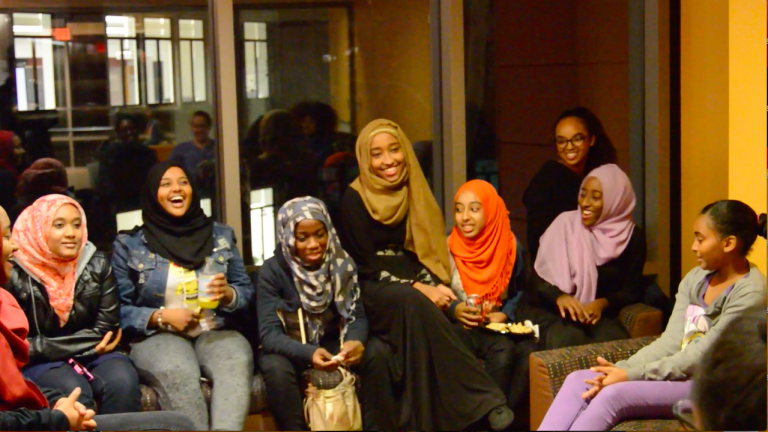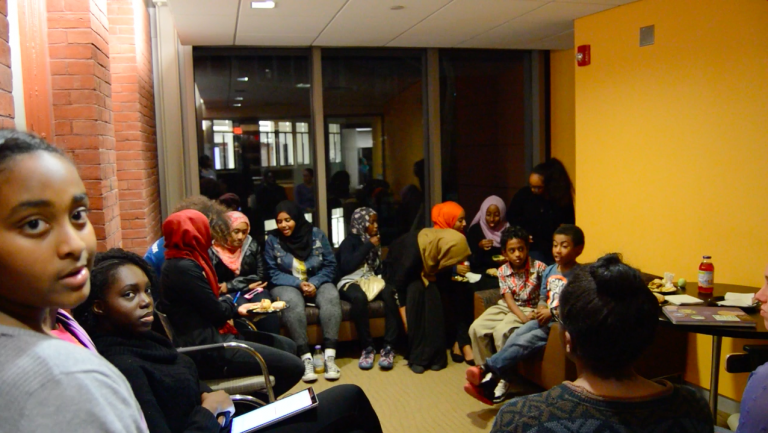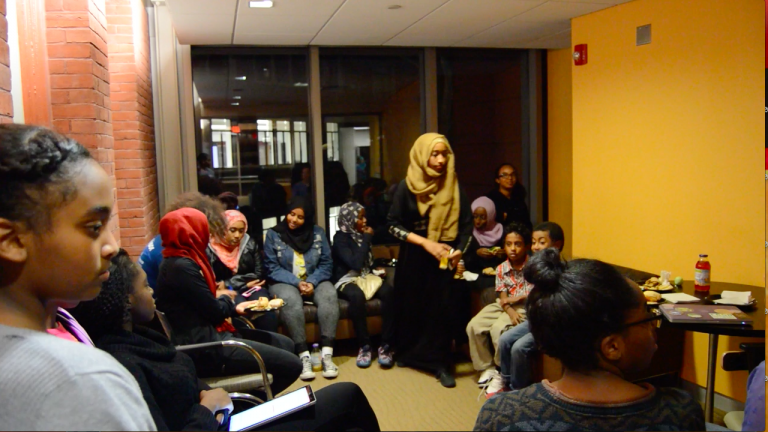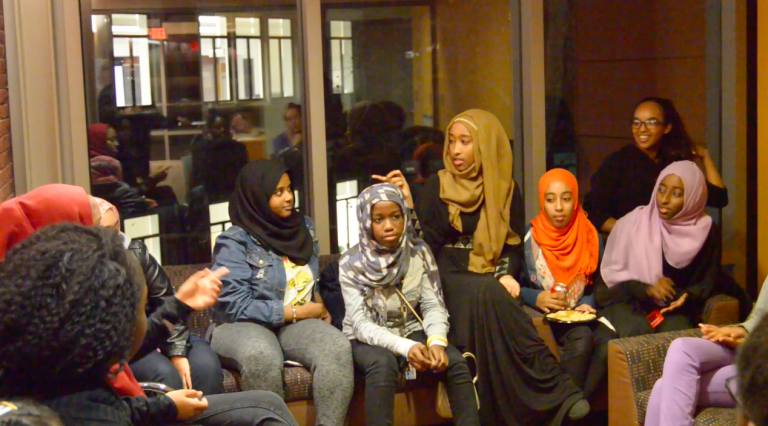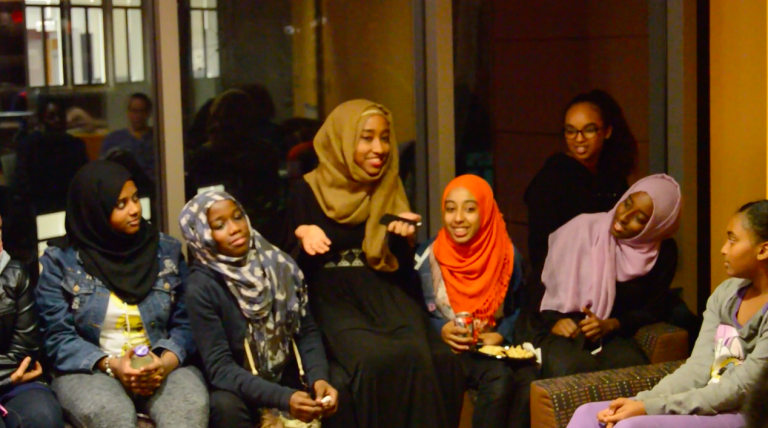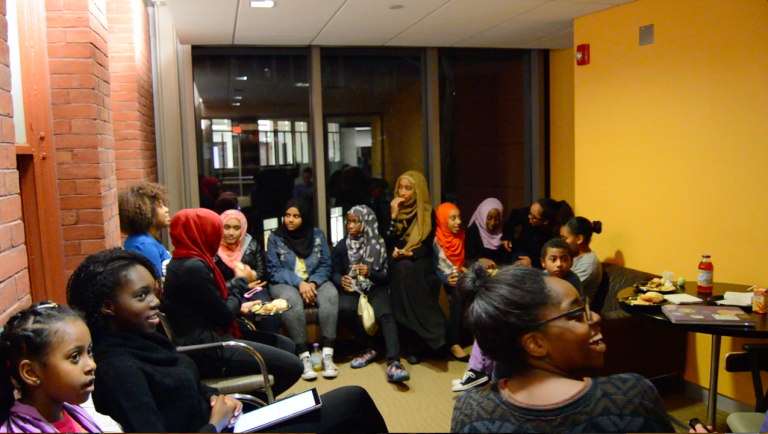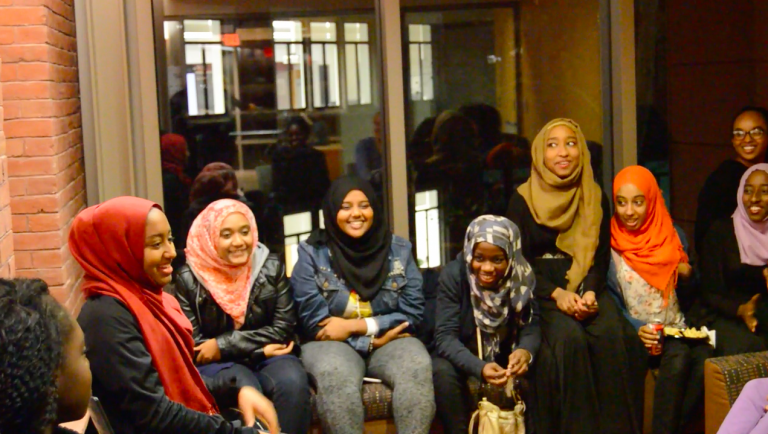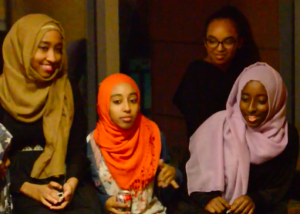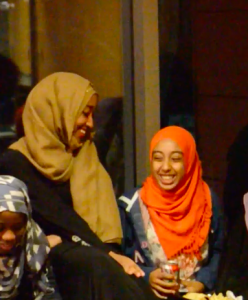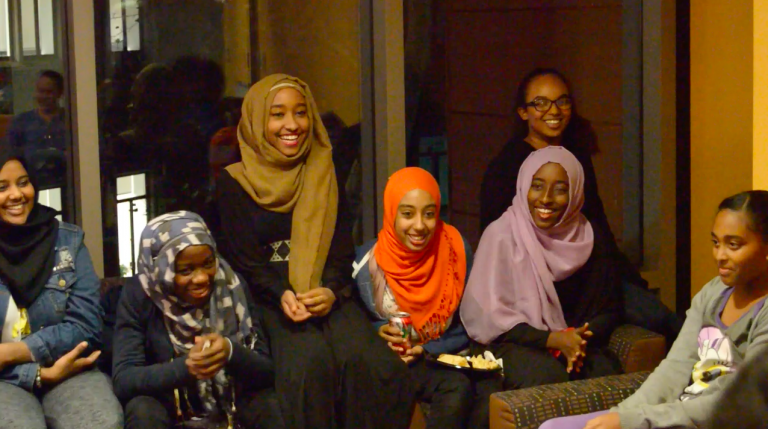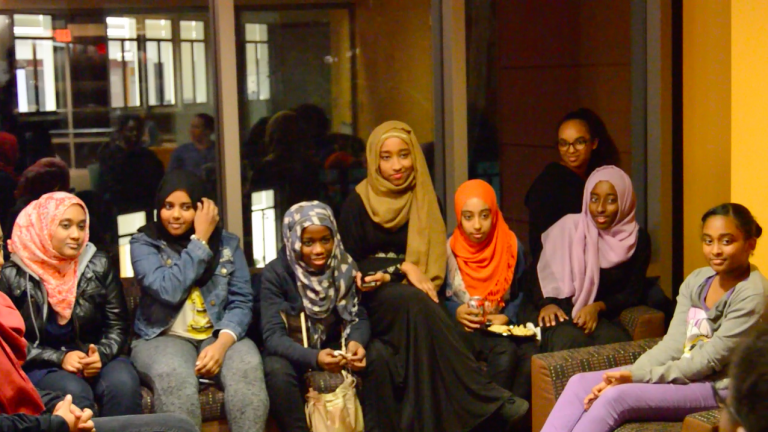“I always say I’m from Sudan. I love Sudan. I love my culture. I love everything about it. I will never be embarrassed to say I’m from Sudan.”
Interviewing these girls, it was obvious to see how proud they all were of their country. Living in America has not broken the girls’ ties with Sudan. They are all honored to represent their country and faith in the USA, and speak excitedly of their past trips to Sudan. When it comes to their identity, however, these young girls do share some confusion. Most of them were born in America, but their parents grew up in Sudan. Explaining to their peers who they are and their background has proven to be difficult. As one girl said, “I never feel truly black, and I never feel 100% Sudanese. So I guess I’m in between.” They all seemed to agree that the term ‘Afro-Arab-Americans’ more perfectly describes who they are, and would give others a better understanding of their identities as well.
“I feel like everyone in Sudan, everyone is just family.”
From left to Right:
Hibah A.- 10th grade Upper Darby High School
Asmaa M.- Nursing DCCC 3rd year
Saraa F.- 10th grade SLA Beaver
Hajer S.- 9th grade Girls’ High
Shimah M.- 10th grade Central
Rymaz A.- 10th Upper Darby High School
Israh M.- 10th SLA
Ethar B-
Halah- 5th grade
Aziza- 3rd grade
Introductions:
Jessica:Hi, I’m Jessica. I sing in Acapella group
girls: oh that’s so cool
Jessica: That’s about it
….
What are you studying?
Oh, I study nursing
Asana: I’m Asana, I’m a Junior.
I study cognitive science. It’s the study of intelligence I guess is the best way to put it. ummm and I also sing in an acapella group. so yeah
1 girl: what’s your name again?
Asana: Asana
1 girl: do you guys sing in the same one?
asana: umm no. There’s a lot of them
Lia: I’m Lia, I don’t sing,
(Laughter)
Uhh I’m a junior I’m studying bioengineering,
Dayo: Wait, I’m studying bioengineering. I did not know that
Lia: really?!
Dayo: Yeah!
Lia: What year are you?
Dayo: 1st year. That’s weird
Lia: We’ll have to talk
2girl: oh wait, you guys don’t like know each other?
Lia: no we do
Dayo: I didn’t know what she was studying
Asana: Cause We have one class together
someone: oh yeah
Lia: and I swim
girls: oh that’s cool. That’s cool too
Jeanmarie: I’m Jeanmarie, I’m studying political science. I told you guys. I used to play tennis and I’m in a sorority on campus
girl 1: Oh my God I always wondered how a sorority was like
Jeanmarie: I’m in a historically black sorority
(snaps)
girl 1: Which one are you in?
Jeanmarie Zeta Phi Beta
sooo if you guys, you know, ever want to look that up, you should do that
Laughter
Jeanmarie: But it’s…
1 girl; are you guys all from philly?
Jeanmarie: Oh, I’m from Philly
Asana: No
girls oh, ok
Jessica: I’m from Miami
Girls: ayyy, oooo (laughter)
2 girl: Why’d you come here?
3 girl: right?that’s what I’m sayin like MIAMI!
(laughter)
Girl: Where are you from?
asana: uh, I’m from Virginia
Girls: oh
Dayo: I’m from D.c.
1 girl: mhm
Lia:I’m from Tallahassee, Florida which is practically Georgia
(laughter) yeah
1girl: oh, that’s so nice
Dayo: So I’m Dayo I’m studying bioengineering and I run track here
girls: ooo
Lia:Engineering and athletes
(laughter and muffled convo)
Hibah:Oh, I’m Hiba. I’m only a tenth grader in Upper Darby High School. Highschool sucks.
(laughter)
Umm I don’t know, I played club soccer. I stopped doing it though.so, I’m tryna. I’m like interested in psychology. I was interested in medical, but then I started like realizing how much I hate math and biology
(laughter)
Hibah: But, I honestly like biology right now. like what we’re like learning but yeah, I’m like interested in talking to people and stuff like that. so it’s like……..??

(From left to right: Hibah & Asmaa)
Asmaa: Hi, i’m Asmaa.uhh I study nursing. I go to community college
Jessica: What year are you?
Asmaa: ummm 3rd year
Jessica: ok
Girls: That’s soo funny…
Saraa: My name is Saraa, I’m a sophomore in highschool. I go to SLA Beaver, which is like on city line avenue umm I play on the soccer team, i’m like captain
(laughter)
Jeanmarie: Nonchalantly!
(more laughter)
Saraa: I know it’s awesome. I didnt even think I was going to be captain, but umm yeah. I hope to be a pediatrician
Jessica: That used to be me
Hajer: Ok, my names Hajer umm I’m in 9th grade, I go to girls high. I play field hockey and lacrosse
Asana: I played field hockey all throughout high school! I love it! (laughter)
Hajer: I suck at field hockey
(laughter)
Hajer: I’m good at Lacrosse. That’s it
Shima: My name is Shima, I’m a sophomore and I go to Central. ike I don’t really know what i’m going to study. but like I’m taking psychology this year, and like, I don’t know I’ve always been interested in stuff like that and I don’t do any sports, but I joined a lot of clubs
Hajer: I forgot to say what I wanted to be. I want to be a forensic pathologist, but I have to major in Chemistry for like the first four years
Asana: But Why..? how do you know that?
Hajer: Because I was li.. I looked it up
Asana: Oh ok
Hajer: and I don’t know why it would be chemistry. I thought it would be biology, but it’s chemistry. I have to go to school for 6 years If I want to like not get a PhD. Just get a degree.
Hibah: I have a question. how long does it take to do nursing?
Jessica: 4 years here
It’s a 4 year program. Just for um to become a registered nurse, then you can get your masters, and your doctorate
Hibah: Is that what you want to do?
Jessica: I want to get my masters
Rymaz:My name is Rymaz in arabic its Rymaz but I dont know why my name is different in English. I got used to it
(From left to right: Rymaz & Aziza)
(laughter)
Rymaz: But um I’m also a sophomore at Upper Darby high School
Hibah:We go to the same school
Rymaz:Yeah, but I don’t really know what I want to study. I like psychology. like engineering, medical, I like my physics class. I don’t know what I want to study yet, but um I used to play Lacrosse. I didn’t make the team last year, but I like the sport.
(laughter)
Rymaz: and umm I joined a lot of clubs at high school
Israh:My name is Israh. I’m a tenth grader. I go to SLA which is like not to far from here
Hibah: yeah they’re twins by the way
Asana: OH!
Rymaz: We’re fraternal we’re fraternal
Asana: Oh ok. Yeah
(laughter)
Rymaz: And I did track last year and like I guess for like. I want to do like a minor in writing, but I don’t know what I would major in
She’s a great writer
She is
Jeanmarie: You trying to write my paper?
I play field Hockey and Lacrosse. I don’t know what I want to study
My name is .. I’m a fifth grader
i like to play soccer and ummm yeah
(laughter)
wait when did you graduate
shes so poppin her cousin is so cool
Yeah she goes to yale and she won
My aunt is like you have to be like her. You have to go to Yale
(chatter)
Dayo: What’s your name?
Aziza:Aziza
Dayo: What grade are you in?
Aziza: 3rd
(laughter and chatter)
Jeanmarie: Also, our professor said, if there are any questions that we ask that you guys don’t want to answer just let us know. Also, it’s like really chill like you don’t have to be uptight (laughter) or tell us anything that you think we want to hear.
Girls: (Yeah. Ok, laughter)
Jeanmarie: I guess we can start off by who was like actually born here or born in Sudan.
Saraa: Born in Sudan?
(chatter about origins)
Saraa: There’s no one born in Sudan here?
Asmaa:I was born in Sudan
Shimah: Wait, you were born here, right?
Ethar: Yeah.
Shimah: You were born here?
Saraa: In Chicago, yes. That’s the U.S. (laughter)
Israh: Well like we go to Sudan. They went this summer. They actually went together.
Saraa: I went this summer
Asana: So it’s common to go for summers?
Girls: Yeah
Saraa: Yeah, almost every summer or every 2 summers
Shimah: We were suppose to go in 2012 though, but we’re trying to go this summer, hopefully.
Ethar: I’m going this summer. We can meet up.
Israh: When we were little, we used to go all the time. Like we didn’t have school.Like 2 years old. But now, me and Shimah didn’t go since like.
Shimah: 2012
Israh: Yeah, but our grandpa came so that was like really cool.
Rymaz: And it’s like hard cause now we have school. So like we used to stay longer.
Hajer: I remember in kindergarten I left school in May to go to Sudan (girls chatter in agreement) But now, I can’t leave school in May! (laughter)
Saraa: Like I gotta finish school first. I don’t want my transcript to say missed all these days!
Jeanmarie: Yeah, all these days absent. (laughter in agreement)
Ethar: Yeah like in third grade like I disappeared. Like I spent a whole year and a half there, and then I came here for fourth grade, and people were like: “Oh you’re back?”
Saraa: Yeah, I also went to Sudan for a year when I was in fifth grade. It was hard for me.
Ethar: Yeah, it kinda like throws you off track, but like it’s better to go when you’re younger. Cause I could never go for like middle school or high school, but like elementary yeah.
Girls: Yeah, yeah (agree)
Shimah: It’s just like I don’t know. Like for me… Like I don’t know if you guys feel like this too, but you get used to like…Cause your life is here, it’s so hard to like adapt there. We’ve always been like… We’ve grown up in America where we’re adapted to like the way of life here. So when you go there yeah for summers it’s fine, cause you know you’re coming back, but actually having the mindset of living there is like whoa! I can’t do that.
Ethar: And then it’s kinda like vice versa for our parents. They LOVE going there!
Hibah: They would stay there if it weren’t for us being in school.
Hajer: My friend she left in like 5th grade. She went to Sudan.She hasn’t come back yet. (laughter) Her parents said like they want her to go to said like they want her to go to college there and stuff, but if you go to college there and you come back to America you’re going to go to college again. (girls agree) It’s not valid.
Hibah: That’s something that happened to my brother too. He’s actually in the other room. He went there for college for one year and then he came back here and it threw him off and he had to start over again.
Girls: (Ohh)
Hibah: Yeah, so he goes to Temple now.
Rymaz: When you come here, they don’t really accept a degree from there.
Israh: It’s like a 3rd World Country and it’s not as valued as other countries (girls agree)
Shimah: It’s like you have an American degree or an American passport.It’s worth so much then you know..
Saraa: It’s like my dad, he went to college in India and i don’t know how they didn’t accept it because India is more known than Sudan. It just threw me off because he worked so hard and they can’t even accept it. That’s 4 years or I don’t know how many years just wasted!
Hajer: My dad went 6 years in Egypt and when he came here they had to go back to school.
Hibaa: Yeah, both my parents came here with bachelor’s degrees
Rymaz: Mine too.
Ethar: It’s like going to college and everything you worked for has gone to waste..
Shimah: It’s like trash. You have to start over.
Rymaz: classes there are harder. If you see them working there, it’s so much more work.
Hibah: They only have 3 years of highschool.
Shimah: Yeah, when we go in the summers we go to school with our cousins cause they’re like, “Oh my God, Americans!” They love when we speak English and stuff.
Saraa: They have a lot of stereotypes.
(laughter)
Shimah: We usually go with our cousins to school and just 1 day there it’s just like “Whoa! I cannot do this I cannot stay here. Like they have this time where like they(teachers) hit them on their hands with their rulers..
Saraa: abuse.
(laughter)
Shimah: So it’s like their way
Ethar: It’s like discipline
Shimah: Going to school and getting a question wrong…. I would not be able to do that
Hibah: And then when you tell them(Sudanese students) things That are here(in the US.) they’re like “What!? Does this happen there? Does this happen there?”
Shimah: The boys and girls school are separated there
Ethar: Well when I went to 4th grade I went to an international British school, and they had a choice whether you wanted classes with boys and girls or just girls and I chose girls. They sit you down and ask you if it’s okay to discipline you like if they hit you on the hand with a ruler. I said no, but my mom said yes.
(laughter)
Hajer: Also in Sudan their classes are so different. It depends on which school you go to, but they try to like mix religion into school You have a math class and you also have an Islamic studies class too so it’s much more than us (the U. S.).
Hibah: Religion is a huge part.
Saraa: When I went to school in 5th grade I went to an international school so it was cool for l=me because in 5th grade I didn’t know a lot of Arabic, but the people that knew English I would communicate with them. I would tell them what I would go through in America like music and events and they would talk about Sudan and what happens there. Help eachother out basically.
Hibah: Cause I went last summer, like a couple months ago and Sudan is like really.. I love being there! Especially because I have family and my friends there and I love being in the diversity there. Ofcourse I love everybody here, but you have all these same people and you all speak Arabic and we all have the same religion. i have so much fun with my family like I did not want to come back. I did not want to come back to school, but then you come back here and you realize you actually want to be here.
(laughter)
Hibah: Like even my cousins were like, “You just had a good summer.That’s why you want to be here.”
(laughter)
Hibah: and it’s like really really hot there and you’re not use to things there like I got sick a couple times. It’s kinda hard.
Shima: I always get sick
Hibah: It’s really different like the hospitals and stuff…you don’t really trust it.
Aziza: They’re really smart but there’s just things that they haven’t like ..
They’re not really showing their full potential cause they don’t have the resources that America has now, like the money…
Hajer: So pretty much like, you give them an Aid bandage they’ll use it for anything, a burn a cut, they’re just happy to have it
Aziza: It’s kinda like everything is five years back, like we’re if you go over there it seems like it’
In the past
Hajer: But that what makes you feel so blessed though cause like you go and like, this summer I came back and I was like yo, I am so blessed! Like it’s crazy, cause I can’t like I think I can’t live like that but people are living like there like that and it’s like it’s just crazy cause they don’t have a lot of things but they don’t even complain.
Shimah: I know that’s the crazy part
Aziza: But it’s not everyone though. There’s a lot of rich people to that live a lavish lifestyle and they’re living good. But then you see people on the streets and things but it doesn’t add up cause it’s just really
Like a villa and somebody living there but outside their house somebody sleeping.
That’s like that everywhere though. It’s like that here too.
Hibah: But I feel like the families, they do what they can to help others that’s also part of the religion.
It’s like giving back.
Shimah: Like my grandma if we have extra food left over, we’ll take it to a less fortunate family, everybody would try to help each other.
Like people stay at mosques and stuff
Shimah: My grandpa, he actually has this thing outside his outside, it’s called a __[00:19:29] It’s shaped like a vase but it’s like…so every night he fills water and anybody passing by, there’s like a little scoop thing, so anybody passing by can come and drink
See that’s one of the…
Shima: They’re so caring there. It’s like they give back and they don’t even have that much to give back. So every time you go there it’s like wow, i can’t believe.. I don’t know, you just get this feeling in your heart, like oh my gosh I’m blessed. It’s crazy. There’s sometimes, like during Ramadan when we fast and you’re like driving by and the sun’s setting, they’ll stop your car and force you to come eat.
Even if it’s a random house they’ll say oh just come
Everyone is together
I feel like everyone in Sudan, everyone is just family [00:20:23]
Not related, nothing
Hibah: You don’t even have to know them, you’re just family
Jeanmarie: When you go back..what parts do you
Hibah: Khartoum capital of the city, that’s where we’re at
Shima: Also, there’s like different tribes so like my dad he’s [00:20:45] but her dad is … usually you take your dad’s side ..so she would kind of be considered __ but my dad’s ___ so we go to the island of … it’s in North Sudan [00:20:57] but that’s different from the city part which is Khartoum. But usually we stay in the city cause it’s just that’s where our houses and stuff are in there. So my mom lives like within Khartoum, she lives in a part called ___ and my dad lives in a part called ___
Hibah: It’s a lot of names. Everyplace has a different name. But I think it’s, it’s basically like, where our parents grew up at, it’s like an island, so we go there, like the island we go there, but we don’t stay that long, it’s harder than living in the city.
Shimah: It’s like 10 times harder than Khartoum.
Hibah: But it’s really really really peaceful and beautiful. I have so many pictures of it on my phone right now. There’s all these palm trees it’s really really pretty it’s just hard. They don’t have streets, they don’t have cars. They just walk everywhere and it’s like burning.
You cannot walk barefoot.
Hibah: There’s like different creatures at night so you can’t even go out.
Scorpions
How long is the bus ride?
Hibah: It’s like 8 hours.
You take a boat cause it’s on an island.
Then you take the bus.
Hibah: That was really hard for me. I stayed there for a week and I almost died. I was like oh my goodness. I’m really sensitive to like, any type of insects. So I was just like, everywhere on my body I was itching so bad.
Hajer: In Sudan they have this thing, I don’t know if any of you guys ever had it but it’s like a net. So like if you … so we have this thing around our house, it’s called a __ [00:22:47] … some people like to sleep. It’s like, it doesn’t have roof but inside is like another house. I don’t know, it’s like so you know in America, in America we have gates around our house, so it’s sort of like that but it’s made of brick and there’s a door and everything. So some people like to sleep outside in that and there’s bugs and stuff. So this net, I don’t know how to explain it. So you put..
You put 4 sticks on the legs of it, and you put the net on top and it protects you from the bugs. Mosquito bugs.
So my family is from ___[00:23:21] so that’s like our
Different tribe, like we’re all different tribes. Well yeah the four of us, well the five of us and then she’s…
Jeanmarie: Wait so can you, some of you guys are related?
Yeah we’re sisters.
Shima: So her dad and my dad are brothers and sisters and then her dad and my mom are brothers and sisters.
They’re actually in the other room.
And then her dad and my mom are cousins.
They’re just sisters.
Hibah: But then them three, we’re just friends with them.
But her dad’s my uncle so that’s my cousin.
That’s really confusing.
We’re like all related.
Somehow.
If you’re Sudanese, you just say you’re all related.
I just found that my mom told me, the relation between me and her, we’re actually related she told me too. It’s like a long …cousins
Your aunt is this and your friend’s this
We’re all connected.
Carol Muller: I just wanted to say something, a couple months ago I went to Washington DC cause South Sudan, they were having a big event so I just went just to see to sort of they were fighting for peace in South Sudan. I couldn’t believe how tall everybody was.
All: Yeah. [laughter]
Carol Muller: Everybody was over 6 foot. The most beautiful women, well you are, they were like supermodel type. Unbelievable.
They’re really tall. So tall.
And the girls are either short or
Aziza: Short short or tall tall
Saraa: But when it comes to size it’s either you’re thick or you’re very skinny. There’s no inbetween. If there is, it’s rare.
Shimah: But now in Sudan when I went this summer, it’s like a big difference in when I went two years ago, you see no South Sudanese people anymore.
It’s like split now, North and South.
Carol Muller: It really made a difference.
They’re all deported.
Hibah: When I went a couple years ago, you would see so many. They were all together.
Carol Muller: In the Khartoum?
Cause we were one country.
Shimah: Now it’s like, near my house there’s this open area, and they would build their South Sudanese people, they would build their houses out of stuff like they find and it’s like they live off of that. So now they take them to their country but I feel like they’re suffering more there cause it’s like they have less resources than we do. But they’re the ones that wanted a whole different country.
Aziza: My dad told me they came around with trucks and stuff and put them on and sent them away. Which is like horrible, and my dad says that not everyone wants them to leave. Like they actually wanted them to stay. They were part of like the yeah it was really controversial topic. There were people who were really crushed like, why are you sending them away and then there were people who
Take them to their country.
It’s just something that no one can ever agree on.
Hajer: It’s sort of like, America with the Mexicans. I mean, it’s sort of like that because some people don’t care if the Mexicans are here but some people want them out. It’s pretty much how it is.
Cause they’re minority so they’re seen or heard less.
And they’re like, a big thing is that they’re a different religion.
A majority of North Sudanese are Muslim, but they’re a majority Christian. So it was just a lot of complications because there’s just not that many mosques, I mean churches, so it was kind of like, why doesn’t the city have churches blah blah blah and stuff.
But we’re a Muslim country so we can’t…
And when they’re here, we’re a stronger force cause there’s more North Sudanese. So they feel like defeated in some way because they still want to build, some of them were born in North Sudan some of their grandparents were born in North Sudan and their ancestors came
Aziza: It’s not like America like oh you’re a citizen you’re allowed to stay. Even if you’re born in North Sudan and you’re a citizen, you’re gonna be sent away.
They see your skin is really dark they’re like..
Hajer: Yeah that’s the thing too, cause South Sudanese are really dark compared to us and there’s kinda a discrimination against them cause they’re not like our kind or whatever but like so that’s, it’s just better for us to split
They see that and then they see the visual like oh you’re different and…
Hajer: You can tell the difference between North Sudanese and South Sudanese. I mean it’s sort of like, when you say it out loud it sounds sort of racist or something. It doesn’t sound like you’re suppose to say it.
But we can tell the difference
And also, we all speak Arabic but their dialect of Arabic is way different than ours. Sometimes it’s even hard for me to understand what they’re talking about. I don’t know it’s just so..
No like if you’re from North Sudan, and you are saying something that no one can understand they use it as an insult like you’re speaking like, they call it ____[00:28:38] or through the South
My brother’s not very good at Arabic, like he’s not…I don’t have an accent when I speak Arabic but his accent is really bad it sound like South Sudanese Arabic so it’s like when he talks they call it ___[00:28:54] that’s like
Broken Arabic basically
So he doesn’t like talking in Arabic cause he’s like I’m not gonna have these people look at me
That’s another thing too like I remember when we used to go, we never used to speak in Arabic with our family cause we knew they were way better than us and then you feel kind of embarrassed I did something wrong didn’t I
I haven’t been there for it’s almost gonna be 4 years in 2016, so my Arabic is not up to date so like, I don’t know it’s just everytime I talk I’m like I sound really broken, let me not. But like once you go back there you start like
Even for like three months you start to
Hibah: I know Arabic good cause I speak it at home with my mom and dad and stuff. But I have siblings and we don’t speak Arabic with each other, we all speak English but then you go to Sudan and I was in Sudan for 2 and half months this summer and I got up to date with everything. You don’t have a choice, you can’t speak English with your aunt or your little cousins. They’d be like, what are you saying. You just have to adapt.
Even if you do speak English for that one percent that knows it, like good, it’s like British English like it’s not even like
That’s another thing, they teach English at the school it’s not, it’s
British English
Jeanmarie: Do you all speak Arabic at home with your parents?
All: Yeah
We’re forced to.
Yeah we have to
To like keep your roots
Another thing is that I don’t know about everyone else but my Grandma would like get mad at me for speaking English partially because she doesn’t know what I’m saying and the other things is like hey, you just you’re in Sudan, speak Arabic.
Yeah
One is because you need to know more Arabic, and one you need to appreciate your culture and language and stuff so I’m like ok cool .
When I’m at home sometimes and I’ll be speaking English, sometimes my parents will speak English with me and then there will be oh yeah try to speak Arabic cause we don’t want you to forget it. Cause I mean all my family is like you have to know Arabic.
Cause my dad has been here longer than my mom and he doesn’t have like a .. his English is obviously not perfect cause like you know, we’re all like not from…English is not our first, well English is not their first language, but he has really good English and he has a slight accent but my mom on the other hand she doesn’t really like speaking English at home and stuff but I’m so used to talking to my dad in English, like we’ll just be talking to each other and then my mom’s like oh what are you doing, talk Arabic you’re at home and stuff you’re gonna forget it and stuff.
My mom blames my dad. She’s like you’re the reason why these kids don’t speak proper Arabic.
My mom and dad would go back and forth. My dad’s like you should start learning English, cause you’re in this country and you want to learn more about the culture and stuff. And then my mom’s like, no they’re already in America, they already know English they should know more about Arabic and the culture and so they go back and forth.
And at some point I think, I don’t know about you guys, but I …. Cause I was born in Philly, but then I like speak English fluently I can speak Arabic too [00:31:49] but it’s not like as fluent.
But then you go to Sudan and they’re like, oh you’re seen as an outsider there.
Yeah
And here you never fully feel American here.
Yeah that’s so true.
Some kids talk about some things, so like one kid was like, oh you never had soul food, I was like no, I only have Sudanese food at home. What is that? So I never feel truly black and I never feel 100% Sudanese so I guess I’m like in between.
Jeanmarie: That’s like what I was going to ask. Yeah I think we have a question like that in class cause like I know a lot of us, we come from different backgrounds and stuff like that and even if you’re considered black or have some type of pigment in your skin, and like um I know a lot of you either go to schools in Philly and you guys go to Upper Darby high school and you guys are in DCCC, and so how is that basically when you’re with your other classmates who are black or come from different countries that have some type melanin or things like that because I know like here at Penn there’s discussion over people who say that there straight up black and people who are like oh my parents are from Nigeria. Things like that. How have you guys like interacted with their students and how does that mold your identity as a whole?
Hibah: Well for me, they would tell me, they would ask me, what do you identify yourself. And well, I have other people that are also American and Sudanese and we discuss it and we’re like oh we should be called Afro Arab Americans cause our country is in Africa however we speak just Arabic. So, and we’re also part of the Arab world, so Afro Arab American, but people would tell me, just say, African American. But I feel African American, Afro Arab American is totally different.
All: Yes.
Hibah: I’ll be in school and somebody will be like, where are you from? And I’ll be like, I always say I’m from Sudan. Like I love Sudan, I love my culture, I love everything about it, I will never be embarrassed to say I’m from Sudan. So I’m like I’m from Sudan and they’ll be like, but where is Sudan. And I’ll be like it’s in Africa. But you’re not dark. You’re not that dark. And I’m like, I don’t have to be that dark. And then I tell them like ok, have you ever seen an Egyptian? They’re like, yeah there like so light. And I’m like where’s Egypt. In Africa, like where’d you think. It’s like, way like you don’t have to be that dark to be from Africa. And I’m just like …
There are white Africans.
Jeanmarie: Our teacher’s African. She’s from South Africa.
It’s hard to explain to people like oh this is and this is this.
Hibah: And then sometimes they’ll be like, I remember, two weeks ago, he’s Asian, but he was in one of my classes and he was like where are you from, I’m from Sudan. Are you born there? No my parents are. So what do you speak? Arab So does that make you Arab or African? And I’m like, both. Like really? So is it like one religion, he kept asking me all these questions, one religion there. Like yes, it’s like well there are more religions there, Christianity and anything but it’s just mostly Muslims. He was like, so like was it originated we’re they all Muslims. I mean yeah I guess. So then he kept asking me questions like, so how did it feel being there? Do you have to do this do you have to do, do you have to cover up? That’s one question so many ask, like when I told them I was going to Sudan, all my friends are like do you have to cover up? And I’m like, …
They’re like do you have to wear the thing that you cover your face with?
Hajer: No actually it depends on where you’re from, because when my mom goes to visit her family, they live in this place it’s called [00:35:29] ______, and there it’s like expected you memorize the whole Quran and everything so when she goes there, like all the ladies cover their face. So when she goes there, she has to do it. It’s like, you go without your face covered, you’re like disrespecting everyone.
Hibah: But see, where I was at. No, it was not like that at all. Like anybody could be walking down the street with no ____[00:35:54] on, everyone wearing whatever they want to wear. But it’s kind of like just expected of you to kind of be covered and modest. Cause if you’re gonna call yourself a Muslim, be modest. You know what I’m saying. And that’s one of the biggest things, if a girl…
Don’t expect to not get weird looks
Hibah: It’s kind of expected of you to be covered and modest because if you’re going to call yourself a Muslim be modest— and that’s one of the biggest things you need to be modest
(interjects)
Girl 2- And don’t expect not to get weird looks
Rymaz: Yeah
Hibah- And even my family were saying like you know people are like saying that we’re not saying we are going to force you to wear the kemar or anything, but people will judge you and we will tell you that straight up you, you’re going to walk out of the house and someone’s going to judge you and be like say you’re not wearing the kemar you came from America and you think you’re going to come in here and not cover. But I wear the kemar, I wear the kemar here and there but I’m just saying to anybody in general, but see that’s the thing and that’s one of the other things I like I guess because I really like to wear my kemar, I feel like it represents me like I know I’m Muslim and I know this, this, and when I go there I feel like I’m surrounding my everybody wearing kemars like all my cousins wear kemars
(interjects)
Girl 3- you fit in
Hibah:…you just kind of feel like no one can ask you “oh why are you wearing a kemar”, sometimes here they’re like Hibah how does it feel wearing a kemar
(interjects)
Girl 2:Yeah like are you Muslim?
Hibah:..aren’t you hot aren’t you this this this
(Overlapping responses)
Do you shower with that on?
Omg, I hate that question so much, do you shower with that on
Do you sleep with that?
Hibah: I try to explain to people like when it comes into religion and the kemar, the number one thing for a woman in Islam is to be modest, that’s just the thing about it like you, and it’s not to everybody, it’s only to men- like it’s not to women. And they’re like oh yeah, sometimes I take off my kemar when I’m with just all girls when we’re in the girls bathroom and I’m just trying to fix my hair, they say whoa like hold up your hair… but I say you’re a girl it doesn’t matter. And they say oh yeah really, and I’m like you don’t have to wear it, you only wear when you’re around another guy, but you don’t have to wear it around your dad, your brother, your uncle, just everybody that’s blood, but if it’s like somebody like you know you walk out the street…
Girl 2: It feels good when you’re in school and you’re educating someone, they thought something else, but you actually been through it so you have the opportunity to tell them oh no that’s not true what you’ve heard like this is how it actually is being Muslim or Sudanese.
Hibah: And that’s another thing too when you’re there in Sudan, I live with my mom’s family and my dad’s family they have two different separate houses, because that’s the way they are. It’s like when I go there I don’t have to wear my kemar because it’s all my uncles, cousins, and they’re all blood so it’s like I fit in more like I can be in the house without a kemar, I walk out and wear a kemar. And I’m comfortable, I’ve worn this for a while now and I’m used to it.
Shimah: And like back to when you were talking about the family thing, my family like I guess I’m not going to say they’re forced to, but everyone just grew up wearing it, so you were kind of expected to wear it, so when it came for me when I ended up wearing my hijab, I eventually knew I was going to wear a hijab because you are supposed to start wearing your hijab once you start going through puberty, that’s when it starts counting against you like you’re required to, but like obviously girls have the choice to not wear it or not
(interjection)
It’s actually bad to force someone.
Shimah:…I think I actually waited a year or a little bit after I like, it was mandatory for me like to start wearing my hijab, but I was thinking to myself like before I put it on fully like I was like oh I obviously know I’m going to wear it and stuff, and the four of us we’re actually really really close, like everybody knows in Philly like oh yeah the four of you guys
(interjection)
Yeah the West girls.
Hibah:That was another thing, since we’re like really really close like we grew up together like..
Shimah:…That’s I was just going to say like they started wearing it before us two
Rymaz:I wore it right away
Hajer: Like right after she came back from Sudan and then she wore it a couple months later
Hibah: It was like kind of weird because everybody would be like she’s wearing it why aren’t you
Shimah:They used to all wear it, and everyone used to be like so home come your sisters are wearing it but you, but you and your sister aren’t, and we’d be like yeah we’ll we’re going to wear it. I’m not going to say that made my decision, but that influenced me more because when you’re surrounded by a group of friends you’re obviously going to have the same interests and do the same things. So like they started wearing their hijab, and I kind of like I don’t know used to wear it to school starting in February and I wore it everywhere except for school and I felt so fake, because why would I like cover up everywhere else…
(interjection)
Hibah: and that’s what we used to tell her, we’d be like are you embarrassed to wear to school, but you can tell she didn’t want to admit it…
Shimah: Yeah like I would wear it everywhere else, yeah like I started wearing in 8th grade and my school was 5th-8th and I just felt weird like everyone already saw my hair, I can’t like …Idk I just felt weird coming out of nowhere one day wearing it, like you guys already saw my hair, so I’ve set my mind to like starting a fresh new year like starting to wear a hijab, so like 9th grade I was going to a new school, not a lot of people from my middle school were coming so like I’ve always kind of like, I knew I was going to wear it eventually, so it was kind of like I don’t want to say a struggle, but like it…
Hibah:..yeah it was a struggle for me
Shimah: Yeah, it kind of was, especially since everyone was together
Girl 4: No one forces you. Like my mom says you’re not suppose to force someone to wear the hijab
(Overlapping comments)
You’re supposed to love it
It’s supposed to come from your heart
Hibah: Yeah and that’s another thing like when I was thinking about wearing this, because like people to get forced. Parents do tell their kids wear it, you need to wear it and I kind of felt like I was really lucky that my parents weren’t like that, like my dad was like, he would always give me advice about it you know I just want you wear it because it’s our religion and I don’t want men looking at you and like your body parts, like talking serious stuff with me, and he would say too I’m not going to force you to do it, this is something you want to do, you’re the one ending up wearing it, I’m not wearing it, you’re going to wear it. It was kind of a struggle for me because I felt so ashamed sometimes, I felt like ashamed when I went out to a place with a lot of Sudanese people and hey would all wear it and I would just be like aw I should wear it
Rymaz: And that’s just here. If you go to Sudan, like even like wearing pants, it’s like you feel so out of place because no one wears pants
Shimah: Like becoming a full hijabi, it’s not just about like wearing the hijab you’re actually supposed to like wear something like this, you’re supposed to fully be covered like wear the hibya and the hijab, like that’s like full hijab because you’re supposed to not show your figure. So I mean I obviously I do were my hibya, like I actually started wearing it more then I used to, but it’s like I’m trying to wear it more often, but it’s hard for me to wear every single day, so like over there like if they don’t wear something like this, then they’ll wear shirts that would come up to here, long sleeved and wear jeans that won’t really show their figure or like maxi skirts. So when you go there and you wear the hijab and you wear a cardigan with jeans and stuff they’ll be like whoa…
(overlapping responses)
Yeah
Oh you’re going out like that
What are you wearing
Shimah:..you have to like get used to, but that’s another thing I like about going there because like I feel so covered there and I feel like so like modest, and I bring that back here and I’m just like yeah I should like really consider start wearing over garments more and I just feel more like more of a Muslim to be honest.
Hibah: But that’s another thing, when I was in Sudan this summer, majority of where I went I would wear an over garment, because everyone around me was wearing an over garment, so I would wear an over garment, but the thing about that is, I didn’t like when people were like oh you actually wear like skinny jeans and stuff, that’s another thing I didn’t like that they would say because I felt like they just don’t, they all just grew up into one thing, you know what I’m saying? I can kind of see like everyone’s perspective and things, that’s the thing with them they only have one mindset, and it’s just like…
Shimah: Going back to what you were saying, there are sometimes to this day, sometimes I feel like I’m kind of being like hypocritical because sometimes I would wear the scarf on my head, but then I’ll wear skinny jeans, and it’s like why when I go there I’m covered, but then when I come here like I’m like, I always wear my hijab, like I never take off my hijab now, it’s a part of me
Ethar: Yeah like it’s something you have to talk about with yourself
I kind of feel like I’m being fake because like i’m still wearing skinny jeans I’m still showing my figure, but I’m still wearing a scarf on my head, but when I go there I don’t, it’s like here it’s not intertwine with the culture and you just kind of have to adapt with your surroundings, but there everyone is covered and everyone is you know dressed like really respectfully so like it’s part of their culture so you have to just go with the flow I guess, but here it’s like eeee should I wear that, but I mean it’s obviously not what people have to say because I would never let someone say ew you’re wearing an over garment, I would never take it off for that, but then you’re just used to you know used to doing certain things here I guess, so it’s like aculture difference
From left to Right
Saraa: Another thing is like back to the hijab and stuff, people would ask me like weird questions. Do you have hair under that? Are you bald? No trust me I’m not bald. People would mistake me for being Indian, so
(overlapping responses)
Same.
Or Puerto Rican
Or Ethiopian
Saraa:…Oh you look so Indian. Me and my mom actually talked about this she wonders if Sudanese have Indian roots, because I think where India is, like it’s not close, but it’s like when it comes to like a long time ago, like it could be a possibility, especially when people say we look alike
Hibah: I get that comment all the time.
Saraa: I take it as a compliment, they’re pretty
Hibah: Before when I wasn’t serious about wearing a kemar, I would have my hair out and everybody would be like, oh my gosh your hair is so pretty
(Overlapping responses)
Why do you wear that
Chatter
Saraa:..they never thought that I had hair, and like I have so much hair
Hajer: Yeah look at Halah, if I didn’t know any better I’d think she were Indian too, that’s just how Sudanese people look
Israh: There was like this one teacher I had, she would never try to understand Sudanese culture, I used to tell her all the time I’m Sudanese I’m Sudanese and one time she was like, she had this really healthy salad, and I said oh my gosh you’re eating so healthy I really like your food, and she said I really like your food too.. like engera, and I’m like that’s Ethiopia. and she would always say like aren’t you from Egypt aren’t you from Ethiopia, Mauritia, she would never try to say that I’m Sudanese, or try to fully sit down and understand and I would always mention it to her and she would just classify Africa let me just name the main countries
Ethar: Back to the hijabi thing, I can’t really like relate to what they’re saying
Hajer: No you can
Ethar:…I can still relate to their struggles. Like I’m looked at differently. There’s always this topic we go to this group at Central, it’s called Salam it’s like a Muslim group and there’s always a topic about- and I remember someone made a comment like if you’re not a hijabi then you’re not serious about your religion, and you’re saying forget your religion and it’s not true
Shimah: I actually know a lot of Muslims that don’t wear the hijab, but they’re like really religious, then you’ll have a girl who does wear the hijab, but she doesn’t even practice, or show herself as a Muslim, or like..I mean I guess people just tend to judge people who don’t wear a hijab like your less than a Muslim than me or you’re just not as religious, and I feel like that’s just not right, because you can’t just judge, like obviously it’s their choice.
Jeanmarie: Do you guys see like a difference between the black muslims here in Philly
(All interject)
YESSSSSSSS
Jeanmarie:…like Muslims from other countries, do you guys want to talk about that?
(All interject)
Yeah
Yeah there’s a lot
Ethar: Muslims here like African American Muslims are, they don’t have the cultural standards.
Hibah: That’s the thing we are really full of culture
Ethar: They’re taking the American culture and trying to eh, it’s just not going to work, like it’s there’s something, it’s just not you know they have like Christmas, and other holidays that just don’t, and they try to intertwine it with Islam and it just doesn’t really work
Hajer: And like a lot of them they have like, they have family members that are Christian, and they’ll say I’m going to my mom’s house this weekend and I’m going to celebrate Christmas and then the next week I’m going to my dad’s house and celebrate Eid, like it’s not how it works
Shimah: I feel like a lot of African American or from America Muslims, like they are really looked at differently by other Muslims that are from other Arab countries like say Sudan, like a Sudanese person like if they meet..they would like look down upon
(Overlapping)
But that’s not supposed to happen
Every Muslim is an equal. Like you’re from the same religion you should just try to just educate people instead of looking down upon them, Like I had this one friend named Maya, her mom was Christian and her dad was Muslim, but she lived her mom, but her mom said she wanted her to stay with her religion because it’s really good and you want to stay with this. I remember she used to ask me so many questions because she didn’t really have anyone a home, and I loved to help her, like I would never look down upon her. Yeah you have a Christian mother, but that doesn’t change the fact that you are a Muslim. I would always try to help her, and she would tell me I would try to wear my over garment but then I see my mom and she doesn’t even wear a kemar, and it’s a struggle, but at least she tried, why look down upon her..and you’re trying to become better
Shima: American Muslims are put into that situation, but for other Arab Muslims that wouldn’t necessarily happen unless you have your mom or dad marry another religion, but see for us our moms would never do that and that’s because of where we are, where we’re from, where they’re from
…..And that’s because in other countries like in North Africa and SW Asia like Islam is part of their culture too, you know what I mean. Most of those countries are Arab countries or North African countries- Islam is a part of it, so it’s like, I don’t want to say you have like a higher understanding of it, but it’s just like it’s a part of your culture so you like do things differently and adapt things differently, but here the predominate religion is Christian, Christianity, so like the African American Muslims here, they’re going to have to work even harder because they weren’t, like Islam wasn’t a religion that was practiced her, it was kind of brought over here, so they’re going to have to try harder to like, to fully commit, whereas us it’s easier because it’s a part of us, we’re born Muslim, like not everyone in Sudan, but majority of Sudanese people like North Sudanese at least are born Muslim and Islam is apart of us, so we adapt to it, so it’s like a part of us, so it’s way easier for us to commit than it is for African American Muslims or Muslims here in general who are born here
Rymaz: And then like mixing religion with culture, it’s like having Eid, like Eid is a religious holiday for Muslims, but it’s like we mix in culture with it like when we have Eid we go to the prayer in the morning and in our culture like walking around people’s houses in Sudan
(Chatter)
Yeah
Yeah but it’s like just our culture
Rymaz: Like go out with your family or like doing something at home, or having a BBQ I guess, but here American Muslims don’t know about that, or at least they don’t practice that, so they’ll be like what you go to people’s houses and stuff
Hibah:Yo, like it’s just so different here. I feel like when I see teenagers I know there, an their dads tell them to come study here, but it’s like so hard for them, so they’ll come, and they don’t know anything about here, they’ll be like 18, they come here and they’re just so lost and it’s like wow that’s kind of really really hard.
Jessica: We have like 5 more minutes you guys were great
Asana: Yeah
Jeanmarie: Yeah you guys were popping
Jessica: you really taught me a lot
Jeanmarie: So our class is a music class basically and we wanted to kinda ask a question geared towards music and community, so being Sudanese and being in Philly and tying in music…
Girl 3: We take music very seriously
That’s what brings us together, like if we’re at a party, every one’s listening to music, everyone’s on the dance for, there’ll be little kids, like mom, dad
(Overlapping)
You don’t have to know anyone, you just get up
That’s how you meet people
It doesn’t matter where weddings etc.
And it’s cultural too
There are so many different types of artists too
Popular Artists Mentioned: A Taste of Music of Sudan
